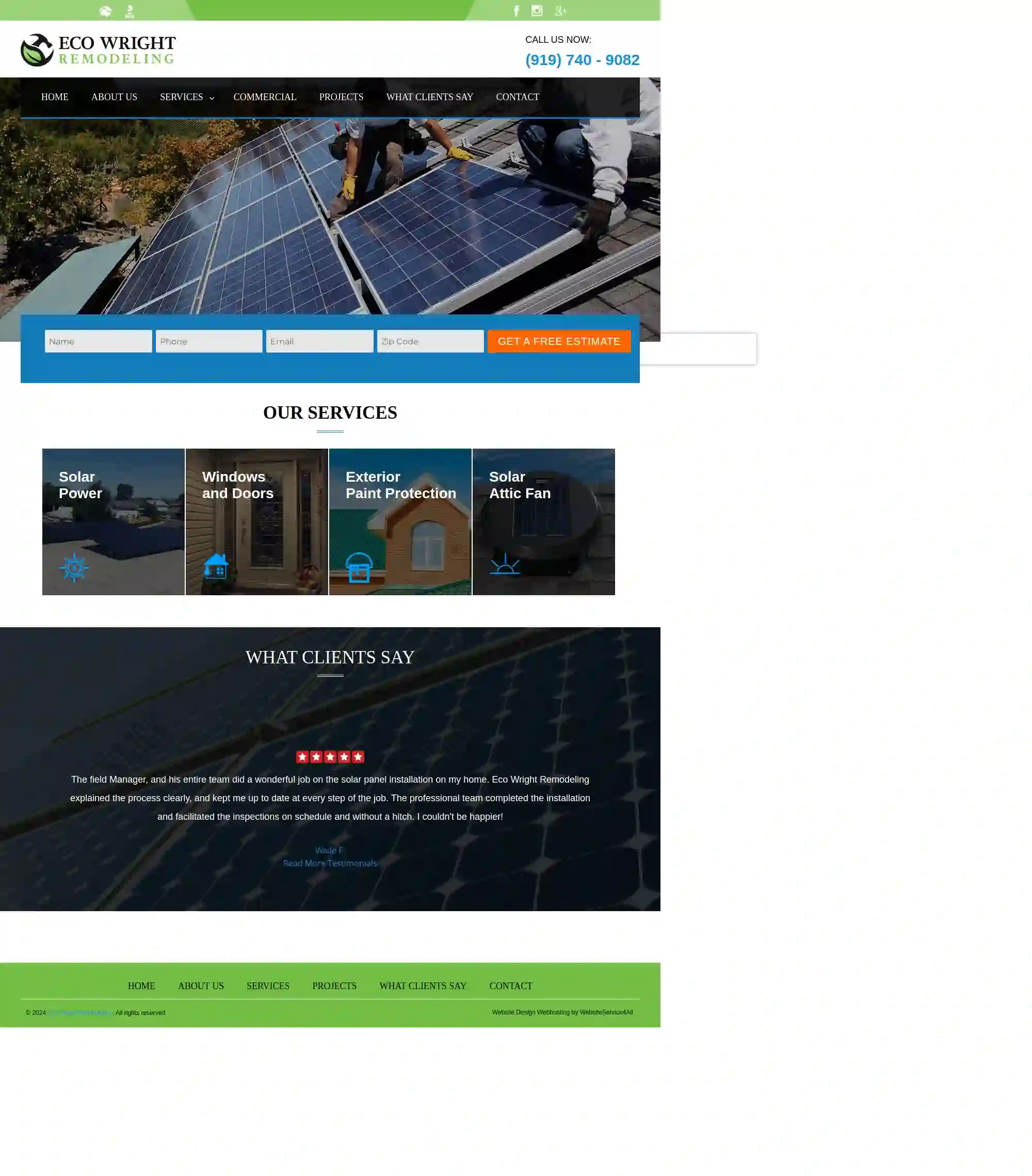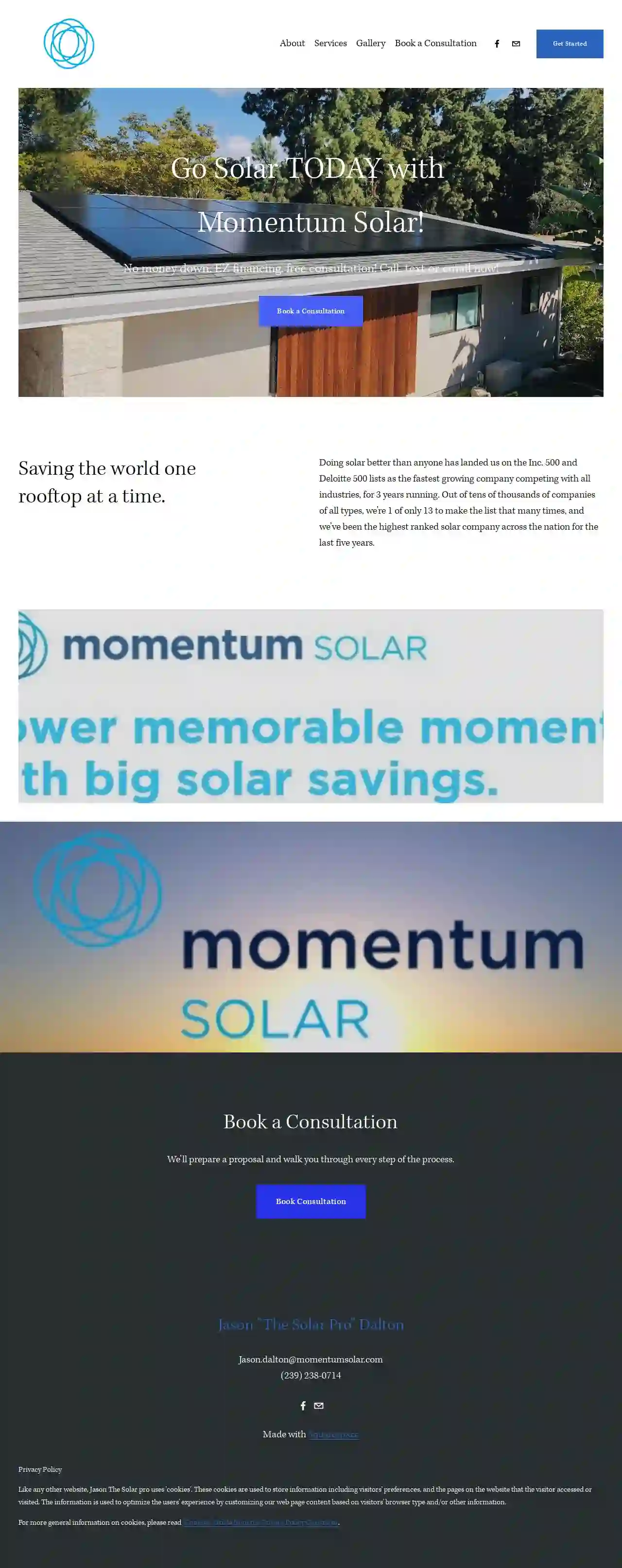Solar Installers Davenport
Find Residential Solar Installers in Davenport
Receive up to 3 Solar Company quotes for your project today! Compare profiles, reviews, accreditations, portfolio, etc... and choose the best deal.

Top Notch Solar USA
52 reviews775 Warner Lane, Orlando, FL, 32803, USTop Notch Solar is a leading provider of high-quality solar roofing solutions. With years of experience in the solar industry, our team of experts is dedicated to helping homeowners and businesses reduce their energy costs while minimizing their environmental impact. We specialize in designing and installing custom solar roofing systems that are both functional and aesthetically pleasing, using only the highest quality materials and the latest technology. At Top Notch Solar, we are committed to providing exceptional customer service and ensuring that our clients are completely satisfied with their solar roofing investment.
- Services
- Why Us?
- Accreditations
- Our Team
- Testimonials
- Gallery
Get Quote
LAZEN Solar
542 reviewsOrlando, FL, 123 Solar Street, 32801, USLazen Solar, a premier solar company based in Orlando, Florida, offers top-tier residential solar solutions, positioning itself as a leader in the region's renewable energy sector. Their expertise in solar energy systems has made them a go-to choice for Orlando residents seeking to transition to solar power. With a strong commitment to quality and customer satisfaction, Lazen Solar is dedicated to helping homeowners harness the abundant solar energy available in Orlando.
- Services
- Why Us?
- Accreditations
- Our Team
- Testimonials
- Gallery
Get Quote
Krannich Solar Southeast, LLC
51 reviews820 SOUTH RONALD REAGAN BLVD, SUITE 110, Longwood, 32750, USKrannich Solar Southeast is a specialist wholesaler of PV and Storage, established in 2021 in Longwood, Florida. We are an expert partner and ally to all of our customers on the Southeast Coast out of the state of Florida, which is known as the sunshine state. By the end of Q1 of 2024, we've grown by a third warehouse and up to 20 employees. We work in a familiar and dynamic environment and we share the Krannich vision of a 100% renewable future!
- Services
- Why Us?
- Accreditations
- Our Team
- Testimonials
- Gallery
Get Quote
Lotus Energy and Solar
4.588 reviews123 Solar Street, Suite 100, Solar City, 12345, USLotus Energy and Solar is a top-rated Solar Energy and Home Improvement company, in operation since 1996. They offer a variety of services including residential solar panel installations, backup power systems, EV charger installations, and more. Their mission is to help homeowners switch to solar energy and reduce their energy bills. They provide a 10-year workmanship warranty, 25-year manufacturer's warranty, and a 25-year production warranty.
- Services
- Why Us?
- Accreditations
- Our Team
- Testimonials
- Gallery
Get Quote
Eco Wright Remodeling
53 reviewsOrlando, USEco Wright Remodeling is a full-service company focused on sustainable energy solutions. They offer a range of services including solar power, energy-efficient windows and doors, exterior paint protection, and radiant barrier attic insulation. Their mission is to provide affordable means to better technology, eliminating the need for fossil fuel and ever-increasing utility bills. They aim to help clients achieve sustainable energy through their innovative solutions.
- Services
- Why Us?
- Testimonials
- Gallery
Get Quote
Happy Energy Solar
53 reviews123 Solar Street, Suite 100, Solar City, 12345, USHappy Energy is a boutique solar firm dedicated to providing homeowners with high-quality solar solutions. They offer trusted and licensed installers, top-tier equipment, comprehensive coverages, fast and reliable customer service, and customized solutions for each home. Their mission is to ensure that homeowners are well-informed on their solar choices and to provide fair pricing. Happy Energy helps navigate homeowners to choose the right company that offers the best solar solution for their home.
- Services
- Why Us?
- Accreditations
- Our Team
- Testimonials
- Gallery
Get Quote
Powur Solar
Beverly Hills, CA, 123 Solar Way, 90210, USAt Powur, we are dedicated to providing innovative solar solutions that empower individuals and communities to harness the power of the sun. Our mission is to accelerate the adoption of renewable energy sources, making the world a cleaner and healthier place. With a team of experienced professionals and a commitment to excellence, we offer a range of services designed to meet the unique needs of our clients. From installation and maintenance to education and support, we are here to help you every step of the way.
- Services
- Why Us?
- Accreditations
- Our Team
- Testimonials
Get Quote
Jason The Solar Pro
52 reviewsN/A, USGo Solar TODAY with Jason the Solar Pro! No money down, EZ financing, free consultation! Call, text or email now! Saving the world one rooftop at a time.
- Services
- Why Us?
- Accreditations
- Our Team
- Testimonials
- Gallery
Get Quote
Bob Heinmiller Solar Solutions
4.578 reviews1519 Bldg 1 W. Smith Street, Orlando, 32804, USBob Heinmiller Solar is a leading provider of solar solutions in Orlando, offering comprehensive solar systems for homes and businesses. With over 20 years of experience, they provide customized solar solutions tailored to specific energy needs. Their services include solar pool heating, solar pool pumps, solar PV systems, and solar water heaters. They use top-quality solar products from reputable manufacturers and offer a commitment to providing high-quality installation services.
- Services
- Why Us?
- Accreditations
- Gallery
Get Quote
AccuSolar
1800 SW 13th Court, Pompano Beach, FL 33069, 33069, USAccuSolar is a leading provider of floating solar solutions, leveraging over twenty years of industry experience to engineer state-of-the-art floating solar systems. Their designs are meticulously crafted with client-specific needs at the forefront, ensuring optimal performance and reliability. AccuSolar's commitment to innovation and sustainability sets them apart, offering businesses a smarter investment in renewable energy.
- Services
- Why Us?
- Accreditations
- Our Team
- Testimonials
- Gallery
Get Quote
Over 4,210+ Solar Installers in our network
Our solar installers operate in Davenport and beyond!
SolarCompaniesHub has curated and vetted the Best Solar Installers near Davenport. Find a top & trustworthy pro today.
Frequently Asked Questions About Solar Installers
- System size (measured in kilowatts, or kW)
- Type of solar panels (monocrystalline, polycrystalline, thin-film)
- Roof complexity (pitch, size, obstructions)
- Labor costs in your area
- Available incentives and rebates
- String Inverters: Connect multiple panels in a series (a 'string'). A cost-effective option for simple systems, but a single panel issue can affect the entire string.
- Microinverters: Attach to each individual solar panel, maximizing energy production even if some panels are shaded. They are more expensive but offer greater efficiency and monitoring capabilities.
- Power Optimizers: Similar to microinverters, but less expensive. They optimize the output of each panel and provide individual panel monitoring, but a central inverter is still required.
- Hybrid Inverters: Combine a solar inverter with a battery charge controller, allowing for seamless integration of battery storage.
What happens if my roof needs to be replaced after I install solar panels?
What is the average cost of solar panel installation in USA?
What are the different types of solar inverters?
What is net metering, and how does it work?
What happens if my roof needs to be replaced after I install solar panels?
What is the average cost of solar panel installation in USA?
- System size (measured in kilowatts, or kW)
- Type of solar panels (monocrystalline, polycrystalline, thin-film)
- Roof complexity (pitch, size, obstructions)
- Labor costs in your area
- Available incentives and rebates
What are the different types of solar inverters?
- String Inverters: Connect multiple panels in a series (a 'string'). A cost-effective option for simple systems, but a single panel issue can affect the entire string.
- Microinverters: Attach to each individual solar panel, maximizing energy production even if some panels are shaded. They are more expensive but offer greater efficiency and monitoring capabilities.
- Power Optimizers: Similar to microinverters, but less expensive. They optimize the output of each panel and provide individual panel monitoring, but a central inverter is still required.
- Hybrid Inverters: Combine a solar inverter with a battery charge controller, allowing for seamless integration of battery storage.